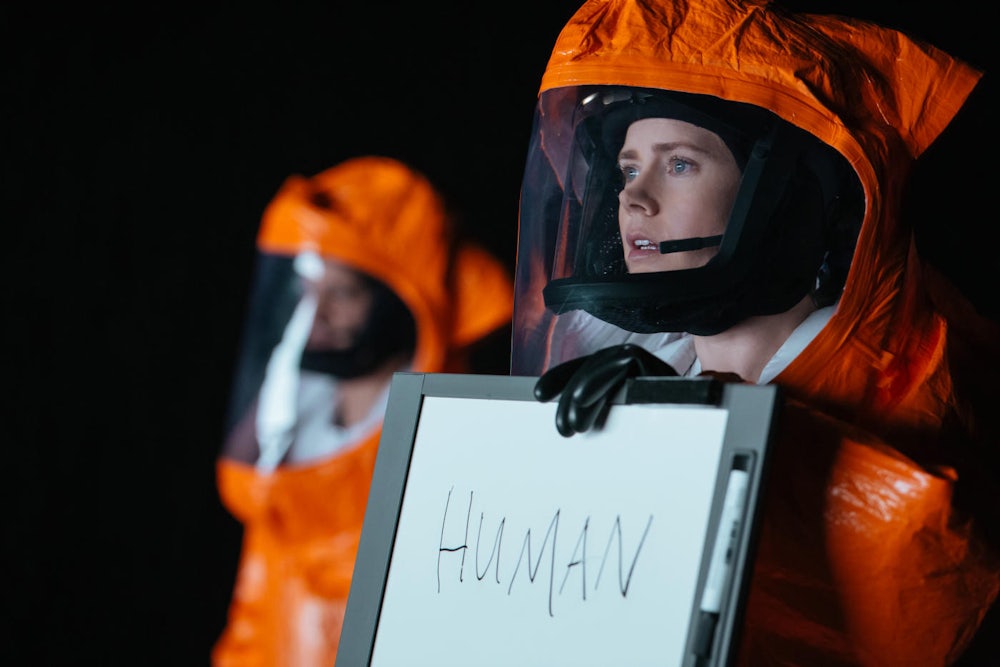Arrival plays with your head as gently as any sci-fi thriller I can remember. Director Denis Villeneuve (Sicario, Prisoners) is a filmmaker who, for all his skills, is sometimes a too proud of his showmanship and intellect. So it’s a relief, and a pleasant surprise, to see him so kind and open-hearted in Arrival, a movie that plays around with your emotions, but never in a way that feels manipulative. This is an alien invasion movie with few aliens, a big Hollywood release with few explosions, and a twisty-plot that holds you comfortably by the hand into, and out of, the abyss. It’s an impressive accomplishment.
Amy Adams plays Dr. Louise Banks, a world-renowned linguist who, when we meet her, is teaching at a university and mourning the death of her child . One day, twelve massive floating orbs appear suddenly in locations all over the world. They seem to be trying to communicate with us, but because no one can understand them, the military calls in Dr. Banks to see if she can decipher their language, to see if they are hostile. Working alongside a scientist (Jeremy Renner), Dr. Banks begins to slowly form a bond with the aliens—too slowly for the antsy military leaders of the United States and China. The film becomes a race between Dr. Banks, who’s trying to figure out what the aliens are trying to tell us, and the warmongers ready to blow them out of the sky.
This makes Arrival sound like more of a conventional thriller than it really is, but to be fair, Villeneuve lulls us in with a character arc that, at first glance, doesn’t look that much different than Gravity, another thoughtful science-fiction moonshot. (A female protagonist who has lost a child uses her intelligence and ingenuity to assess an impossible situation.) He also gives Dr. Banks some rather silly stock characters to bump up against—Michael Stuhlbarg is mostly wasted as a bureaucrat who exists solely to be wrong. But Villeneuve is up to something more ambitious here. Dr. Banks is attempting to solve a mystery while still wrestling with her own demons, and as a filmmaker he shoots in a way that, intriguingly, seems to mix the two. At first it seems much more stock than it is—Basic Backstory 101—but that’s just Villeneuve slowly pulling the rug out from under you. There are twists, but they always feel organic to the story Villeneuve is telling. He’s playing a trick, but he’s not trying to trick you. This is the sort of movie that M. Night Shyamalan would bungle.
Much of this can be ascribed to Adams, one of our finest actresses, who has a terrific part to dig into here. Dr. Banks is brilliant but never showy, with a steely resolve that seems, at least at first, to be a direct result of her family tragedy. She’s scared of these aliens and what this might mean for her world, but more than anything she’s fascinated: This is the greatest challenge of her professional career, and you see Adams embrace it and grow increasingly enthusiastic and compelled. The movie has an uncommon faith in intelligence for a Hollywood movie about aliens, and it’s telling that we barely see the aliens at all, and then only in shadow and hidden by clouds. The movie isn’t about aliens: It’s about how we communicate with one another, and how that communication is vital to our understanding of the world. Dr. Banks learns to speak the language of the aliens, not just to figure out what they have to tell us, but what we must know ourselves. Adams is the perfect actress for this part: tough and tender, vulnerable but eager, and above all absolutely committed to unraveling this mystery.
When the conclusion of Arrival comes, it’s with a shock, but a deeply satisfying one: When you understand what has been happening, it all clicks that of course this is where this story was going all along. But the movie doesn’t suffer from excessive self-regard like some of Villaneuve’s other films. He keeps himself mostly in check here, trusting his story and carefully guiding us along the way. This is a smart, almost cerebral film that leaves you in the dark for most of the way before revealing, at the exact right moment, that this all was much more about the heart than the head. Arrival is a science fiction film about the value of knowledge, the warmth of connection and the vitality of communication. It’s about listening, and being heard, and learning. In a film of this scope, this kind of message feels downright revolutionary.
Grade: B+
Grierson & Leitch write about the movies regularly for the New Republic and host a podcast on film. Follow them on Twitter @griersonleitch or visit their site griersonleitch.com.
